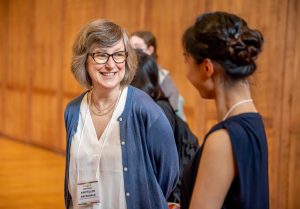Questions about how we produce, comprehend, and remember language are typically investigated by separate research labs. But Psychology Professor Maryellen MacDonald, who joined the UW-Madison faculty in 2001 and retired at the end of the 2022-2023 academic year, took an integrative approach to the study of psycholinguistics.
Careful to avoid research “silos” in which researchers fail to consider the perspectives and discoveries of other relevant research areas, MacDonald’s research in the Language & Cognitive Neuroscience Lab explored connections between language production, comprehension, and memory.
“Maryellen has engaged in formative research in all three of these arenas,” says Psychology Professor Jenny Saffran, whose research focuses on infant language learning. “Perhaps even more importantly, she was the first person to really think about them in tandem, and to deeply consider how they interact in creating the language that we speak and the language input that we learn from.”

MacDonald developed the Production-Distribution-Comprehension (PDC) account, a claim proposing that understanding how we produce language is crucial to understanding how we comprehend it. The PDC helps explain that language production is relatively harder than comprehension, so speakers use a variety of strategies to make talking easier, like the Easy First strategy, in which people produce easy words and phrases in a sentence before harder ones. These strategies, rather than innate brain circuitry as comprehension researchers previously assumed, lead us to prefer certain language patterns, which we unconsciously practice and learn due to their frequency as we hear, read, and see language.
MacDonald’s big-picture approach and work crossing traditional research boundaries impacted undergraduate students in her classes, graduate students, and faculty members across the department, former PhD student Elise Hopman says.“Whenever there would be any type of talk in the department, and it could be on personality psychology, clinical psychology, anything, it didn’t matter what it had to do with,” says Hopman, “Maryellen would always ask the most intelligent question that made you think about how that work connected to other subfields of psychology.”
→ Tell us how Professor MacDonald impacted you.
MacDonald worked for more than two decades to link the fields of language production and comprehension with memory over brief periods, like remembering a phone number or grocery list. Many people who have language impairments also have impairments in memory for language, and MacDonald advocated for integrating these fields with potential implications for helping people with interconnected impairments. MacDonald and her students published extensive theoretical reviews arguing for their approach in 2002, 2009, and 2020.
“These papers have been widely cited, but science can move cautiously sometimes,” MacDonald says. “I think we are seeing increasing evidence of the fields finally making some progress coming together.”
In the last few years, MacDonald also studied how speaking compares to other actions, like making coffee or playing music. MacDonald and her team found the Easy First strategy also exists in the improvised solos of jazz musicians, suggesting this unconscious strategy is not language specific. These comparisons advance our understanding of what makes human language special and of commonalities between the actions of humans and species that do not talk.
MacDonald started her academic journey at the University of Texas at Austin, where she completed a mix of psychology, linguistics, and computer science courses. She earned her PhD in Psychology with a minor in Linguistics from UCLA in 1986 and conducted postdoctoral research at Carnegie Mellon University. MacDonald held faculty positions at Northeastern University, MIT, and the University of Southern California before coming to UW-Madison, where she was appointed the Donald P. Hayes Professorship.
“I think it is safe to say that my own work, on infant language learning, could not have happened without the formative research that Maryellen and her colleagues did focused on adult language comprehension — it was field-changing,” Saffran says. “And her ideas and thinking have continued to influence all of my research to this day.”
After the second language learning app Duolingo invited MacDonald to speak at a colloquium about her shared research with Hopman on second language learning, MacDonald invited Hopman to give a joint talk and attend the colloquium with her. Now Hopman works as a learning scientist at Duolingo, drawing upon principles of cognitive psychology they learned working with MacDonald. “Typically, professors want you to follow in their footsteps and become an eminent professor yourself,” Hopman says. “But Maryellen gave me the leg up that I needed for my dream job.”
MacDonald taught courses that encouraged graduate students from across departments to think widely about how people learn, comprehend, and produce language. MacDonald also taught the undergraduate course Psychology 413: Language, Mind, & Brain.
“So much of how we use and learn language is unconscious, and I loved pulling back the curtain and helping the students see the amazing things they’re able to do with language, and what language is able to do for them,” MacDonald says.
In retirement, MacDonald plans to pursue further research collaborations and travel more. In the immediate future, she plans to finish her book geared toward general audiences, which has the working title More than Words: How We Talk, How Talking Changes Us.
Written by Sara Stanislawski x’25